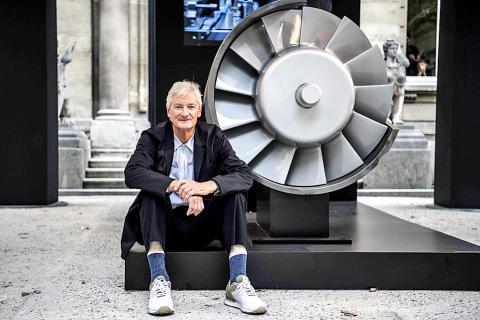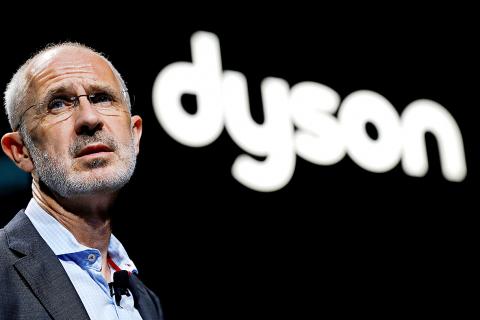The decision by technology giant Dyson Ltd to relocate its headquarters to Singapore could see the company enjoy significant tax benefits, depending on where it registers the intellectual property for its next generation of products, a leading tax expert said.
Dyson sent shockwaves across the business and political worlds last week when it announced the relocation from Wiltshire County, England, which would see two senior executives move to Singapore.
Dyson chief executive officer Jim Rowan said that the decision was nothing to do with Brexit or tax, but rather to “make us future-proof.”

Photo: AFP
Experts agreed the move would have little impact on the tax Dyson pays on its current product lines.
“It is unlikely Dyson will change existing tax structures much,” said Richard Murphy, professor of practice in international political economy at City, University of London, who runs the Tax Research Web site and is a cofounder of the Tax Justice Network.
“There would be a heavy capital gains cost for moving existing intellectual property [IP] out of the UK and the UK patent box is already attractive to the company, but if it hopes to be a market leader in electric cars — and that seems to be its plan — then thousands of patents may follow,” Murphy said.

Photo: Reuters
Where these patents are located might prove crucial to the company’s fortunes, Murphy said.
“Singapore does not tax income earned outside its territory and is fairly relaxed about a company locating income and IP in tax havens. So Dyson could win heavily in the long term, in tax terms, if its electric cars do prove to have a winning technology, which may give rise to largely untaxed income in any new structure,” he said.
“The change is about the movement of two senior executives and the legal entity,” a Dyson spokesman said. “This recognizes the increasing significance of Asia to Dyson. An increasing majority of Dyson’s customers and all of our manufacturing operations and production are now in Asia.”
“This shift has been occurring for some time — which we have long communicated — and will quicken as Dyson brings its electric vehicle to market,” the spokesman said. “There will be no impact on the physical location of any teams, the ownership of IP will not move and our patent-filing strategy will not change. The impact on where Dyson pays its tax is negligible.”
When asked where Dyson’s IP is located, the spokesman said: “All IP generated in the UK will be registered and taxed in the UK. We do also develop IP elsewhere.”
Singapore’s fiscal system has been lauded by a number of senior members of Britain’s ruling Conservative Party and business leaders who have been promoting Brexit.
British Prime Minister Theresa May and British Chancellor of the Exchequer Philip Hammond have said they could turn the UK into a low-tax economy — the Singapore of the West — if a deal with the EU cannot be found.
However, Murphy said it would be difficult for the UK to replicate the Singapore model.
“More than 80 percent of people [in Singapore] live in government-owned housing, so it does not need to tax people; it just charges rent. And many of its largest companies are also state-owned, so, again, local taxes on profits do not matter as much as they do in the UK, because the government gets a large chuck of local profits anyway. It can offer low taxes and not have its revenues threatened,” Murphy said.
“This is fundamentally different to the UK, where the government is dependent on tax,” he said.
Murphy said that other companies might follow Dyson’s lead.
“This could be the start of an exodus. The UK post-Brexit will not be able to impose sanctions on anyone leaving, because it would deter anyone coming in, and we will be desperate for every friend we can find. In that case, there is an increased risk that companies will leave for even lower-taxed locations, which we cannot emulate without abandoning the NHS [the UK’s National Health System], state pensions or state education.”

SEEKING CLARITY: Washington should not adopt measures that create uncertainties for ‘existing semiconductor investments,’ TSMC said referring to its US$165 billion in the US Taiwan Semiconductor Manufacturing Co (TSMC, 台積電) told the US that any future tariffs on Taiwanese semiconductors could reduce demand for chips and derail its pledge to increase its investment in Arizona. “New import restrictions could jeopardize current US leadership in the competitive technology industry and create uncertainties for many committed semiconductor capital projects in the US, including TSMC Arizona’s significant investment plan in Phoenix,” the chipmaker wrote in a letter to the US Department of Commerce. TSMC issued the warning in response to a solicitation for comments by the department on a possible tariff on semiconductor imports by US President Donald Trump’s

The government has launched a three-pronged strategy to attract local and international talent, aiming to position Taiwan as a new global hub following Nvidia Corp’s announcement that it has chosen Taipei as the site of its Taiwan headquarters. Nvidia cofounder and CEO Jensen Huang (黃仁勳) on Monday last week announced during his keynote speech at the Computex trade show in Taipei that the Nvidia Constellation, the company’s planned Taiwan headquarters, would be located in the Beitou-Shilin Technology Park (北投士林科技園區) in Taipei. Huang’s decision to establish a base in Taiwan is “primarily due to Taiwan’s talent pool and its strength in the semiconductor

Industrial production expanded 22.31 percent annually last month to 107.51, as increases in demand for high-performance computing (HPC) and artificial intelligence (AI) applications drove demand for locally-made chips and components. The manufacturing production index climbed 23.68 percent year-on-year to 108.37, marking the 14th consecutive month of increase, the Ministry of Economic Affairs said. In the first four months of this year, industrial and manufacturing production indices expanded 14.31 percent and 15.22 percent year-on-year, ministry data showed. The growth momentum is to extend into this month, with the manufacturing production index expected to rise between 11 percent and 15.1 percent annually, Department of Statistics

An earnings report from semiconductor giant and artificial intelligence (AI) bellwether Nvidia Corp takes center stage for Wall Street this week, as stocks hit a speed bump of worries over US federal deficits driving up Treasury yields. US equities pulled back last week after a torrid rally, as investors turned their attention to tax and spending legislation poised to swell the US government’s US$36 trillion in debt. Long-dated US Treasury yields rose amid the fiscal worries, with the 30-year yield topping 5 percent and hitting its highest level since late 2023. Stocks were dealt another blow on Friday when US President Donald